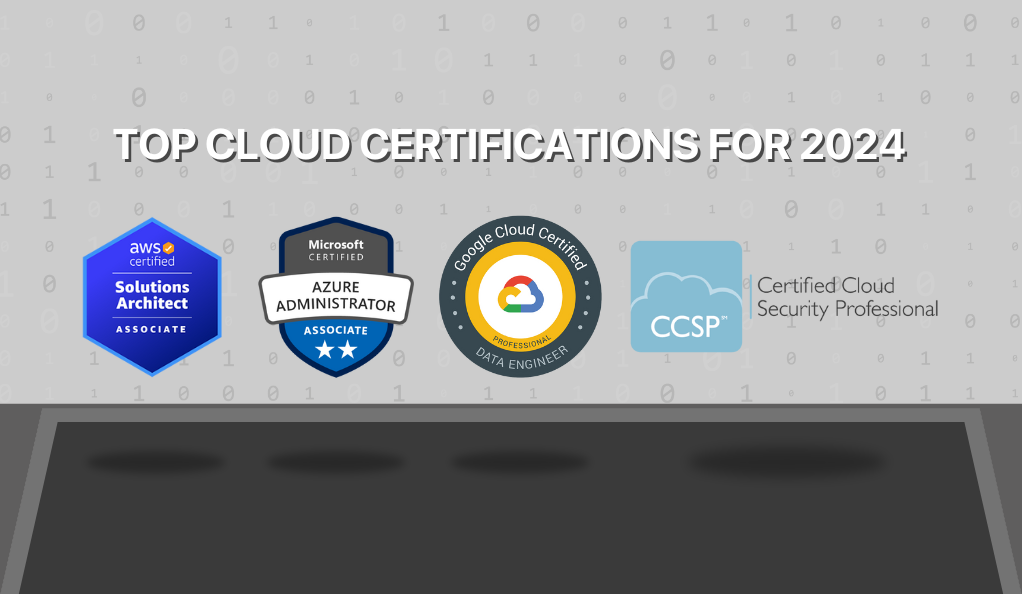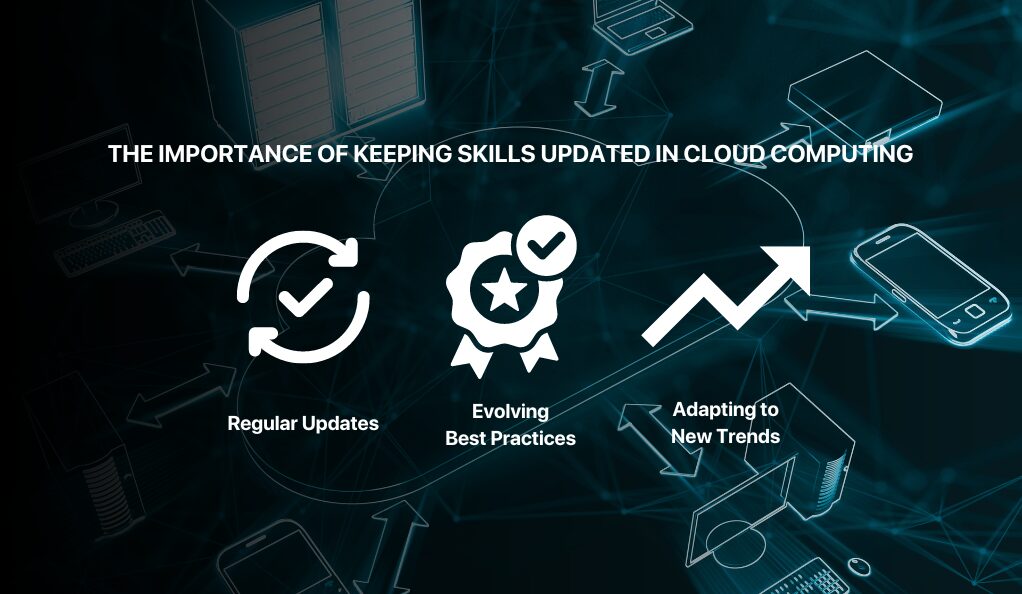Navigating Cloud Certifications: Essential Guide for IT Professionals in 2024
In today’s tech-driven world, cloud certifications are key for IT professionals, offering a pathway to enhanced skills, better job opportunities, and staying ahead in the ever-evolving field of cloud computing.
Overview of the Importance of Cloud Certifications in the IT Industry
In the fast-paced world of technology, cloud certifications have become a key for IT professionals. These certifications show employers that you have the skills and knowledge needed in cloud computing. They aren’t just pieces of paper; they are proof that you can handle cloud-based tasks and systems. As more businesses move their operations to the cloud, the demand for skilled professionals in this area is skyrocketing. Having a cloud certification can make you stand out in the job market, offering better job opportunities and potentially higher salaries.
Brief Mention of the Evolving Cloud Technology Landscape
The cloud technology landscape is always changing. New technologies and updates come out constantly. This means what was relevant yesterday might not be enough today. Staying updated with these changes is crucial. Cloud certifications are a way to keep up with this fast-changing field. By earning these certifications, you demonstrate that your skills are current and in line with the latest industry standards. It’s not just about getting certified once; it’s about a commitment to continuous learning and staying on top of the latest trends in cloud technology.
The Rise of Cloud Computing in IT
Cloud computing’s rise reshapes the IT landscape, introducing new technologies and opportunities. It’s pivotal for businesses, offering flexibility, scalability, and cost efficiency, and demands updated skills from IT professionals.

Image Source: imgflip.com
Expanding Role of Cloud Computing in Modern Businesses
Cloud computing has dramatically changed how businesses operate today. It’s not just a tech trend; it’s a pivotal part of the IT industry. Companies, big and small, are shifting their operations to cloud platforms. This move offers them flexibility, scalability, and cost-effectiveness. With cloud computing, businesses can access data and applications over the internet, anytime and anywhere. This ease of access is revolutionizing the way companies work and manage their data.
- Cost Efficiency: Cloud platforms reduce the need for physical hardware, cutting down costs.
- Scalability: Businesses can easily scale their IT resources up or down based on needs.
- Flexibility: Remote access to data and applications enhances work flexibility.
The Impact of Cloud Computing on IT Professionals
For IT professionals, the rise of cloud computing has opened new doors of opportunities and challenges. Now, they need to be skilled in managing cloud services and infrastructure. The demand for professionals who can navigate these cloud environments is increasing. It’s not just about understanding the technology; it’s about adapting to a cloud-first approach in solving business problems.
- New Job Roles: Emergence of roles like Cloud Architect, Cloud Security Specialist, etc.
- Skill Upgrade: Need for existing IT professionals to learn cloud technologies.
- Career Advancement: Cloud certifications can lead to better job positions and salaries.
Why Cloud Certifications Matter
Cloud certifications are vital in today’s IT landscape, offering validation of skills, enhanced career prospects, and alignment with industry demands, making them essential for professional growth and success in cloud computing.
Enhancing Career Prospects with Certifications
Cloud certifications are more than just a trend in the IT industry; they are essential for anyone looking to advance their career in this field. These certifications serve as a badge of expertise and commitment to the profession. They tell employers that you have the specific skills and knowledge they are looking for. This is especially important in a field that’s as competitive and rapidly evolving as IT and cloud computing.
- Recognition of Expertise: Certifications validate your skills and knowledge.
- Higher Employability: Certified professionals often have an edge in the job market.
- Increased Earning Potential: Many times, having a certification can lead to higher salaries.
The Correlation Between Certifications and Industry Demands
The IT industry is constantly looking for professionals who are not just skilled but also up-to-date with the latest technologies. Cloud certifications ensure that the professionals have met the industry standards and are familiar with the latest advancements in cloud technology. This alignment with industry demands makes certified professionals highly valuable.
- Meeting Industry Standards: Certifications ensure that your skills meet the latest industry standards.
- Staying Relevant: They help you stay relevant in a rapidly evolving field.
- Building Professional Credibility: Certifications enhance your professional image and credibility.
Top Cloud Certifications for 2024
For 2024, the landscape of cloud certifications continues to evolve, offering IT professionals a variety of paths to enhance their skills and career prospects. These certifications, spanning from AWS to Azure and Google Cloud, are crucial for staying relevant in the dynamic world of cloud technology.
Key Certifications for Cloud Professionals

In 2024, specific cloud certifications are highly relevant and globally recognized, offering diverse career opportunities in cloud computing, including architecture, security, and operations.
- AWS Certified Solutions Architect: Ideal for those who want to design distributed systems on AWS.
- Microsoft Certified Azure Administrator: Perfect for IT professionals focusing on the Microsoft Azure platform.
- Google Cloud Certified Professional Data Engineer: Great for those interested in data solutions on Google Cloud.
- Certified Cloud Security Professional (CCSP): Best for IT professionals focusing on cloud security.
Importance of Each Certification
Each of these certifications serves a specific purpose and caters to a different aspect of cloud computing.
- AWS Certified Solutions Architect: Demonstrates expertise in designing scalable, elastic, and reliable applications on AWS.
- Microsoft Certified Azure Administrator: Focuses on managing, implementing, and monitoring an organization’s Azure environment.
- Google Cloud Certified Professional Data Engineer: Highlights skills in designing and building data processing systems on Google Cloud.
- Certified Cloud Security Professional (CCSP): Shows deep knowledge and expertise in cloud security.
Choosing the Right Cloud Certification
Selecting the right cloud certification is crucial for aligning with your career goals and the demands of the IT industry. It involves considering factors like your current skills, desired job role, industry trends, and the specific benefits of each certification.
Factors to Consider When Selecting a Certification
Choosing the right cloud certification is a crucial decision for IT professionals. It’s important to consider various factors to ensure that the certification aligns with your career goals and the demands of the IT industry. Here are some key considerations:
- Your Current Skill Level: Are you a beginner or an experienced professional? Choose a certification that matches your current expertise.
- Career Goals: Consider what type of role or specialization you are aiming for in your career.
- Industry Requirements: Look at what certifications are most in demand in the industry sectors you are interested in.
- Cost and Time Commitment: Evaluate the cost of the certification and the time required to prepare for and take the exam.

Vendor-Specific vs. Vendor-Neutral Certifications
Vendor-specific certifications, such as AWS, Azure, or Google Cloud, focus on specific technologies and platforms, making them suitable for roles within those ecosystems. On the other hand, vendor-neutral certifications provide knowledge applicable across various cloud platforms, helping you grasp general cloud concepts. Your decision should align with your career goals and the IT industry’s demands, ensuring your chosen certification supports your professional aspirations effectively.
Preparation Strategies for Cloud Certification Exams
For successful cloud certification exam preparation, it’s crucial to combine thorough study of relevant materials, practice tests, and hands-on experience with cloud technologies, ensuring a well-rounded understanding and skill set.
Effective Study Techniques and Resources
Preparing for cloud certification exams requires a focused and strategic approach. It’s essential to utilize effective study techniques and the right resources to ensure success.
- Understand the Exam Format: Familiarize yourself with the type of questions, duration, and structure of the exam.
- Use Official Study Guides: These guides are tailored to cover all the exam topics.
- Online Courses and Tutorials: Platforms like Coursera, Udemy, and Pluralsight offer comprehensive courses for cloud certifications.
- Practice Exams: Test your knowledge with practice exams to gauge your readiness.
Balancing Practical Experience with Theoretical Knowledge
While theoretical knowledge is important, practical experience is crucial for cloud certification exams.
- Hands-On Practice: Engage in practical exercises and labs to apply what you’ve learned.
- Join Study Groups and Forums: Connect with others preparing for the same exams to share knowledge and tips.
- Seek Professional Training: If possible, attend training sessions conducted by certified professionals.
Career Advancements and Opportunities
Earning cloud certifications opens a world of career advancements and opportunities in IT. These credentials can lead to higher positions, increased salaries, and recognition as a skilled professional in the rapidly evolving field of cloud technology.
New Career Paths Opened by Cloud Certifications
Cloud certifications can significantly impact your career, opening up new paths and opportunities. With the growing reliance on cloud technologies, these certifications are highly valued in the IT industry.
- Diverse Job Roles: Gain access to various roles like Cloud Architect, DevOps Engineer, and Cloud Consultant.
- Competitive Edge: Stand out in the job market with specialized skills.
- Higher Earning Potential: Certified professionals often command higher salaries due to their specialized knowledge.
Real-World Examples of Career Growth Post-Certification
Understanding the impact of cloud certifications on career growth becomes evident through real-world examples. Certified professionals’ testimonials, company case studies showcasing their contributions, and industry surveys demonstrating the link between certifications and career advancement all underscore the value of these credentials. Cloud certifications serve as vital pathways to enhanced career opportunities and professional development, regardless of your career stage.
The Cost-Benefit Analysis of Cloud Certifications
The Cost-Benefit Analysis of Cloud Certifications explores the balance between the investment in obtaining these certifications and their impact on career growth, salary, and professional opportunities in the IT industry.
Evaluating the Investment in Cloud Certifications
Investing in cloud certifications involves considering both the costs and the potential benefits. While there is an upfront cost, the long-term gains can be significant.
- Direct Costs: Includes exam fees, study materials, and possible training courses.
- Time Investment: The time spent in preparation is also a cost to consider.
- Potential Returns: Increased salary, better job opportunities, and enhanced professional credibility.
Assessing the Financial and Career Benefits
The benefits of cloud certifications extend beyond just the financial aspect.
- Salary Increase: Certified professionals often see a significant increase in their earnings.
- Career Opportunities: Certifications open doors to new and advanced roles in the IT industry.
- Professional Recognition: Being certified can enhance your reputation and standing in the professional community.
Staying Current: The Need for Continuous Learning
In the dynamic landscape of cloud computing, continuous learning is imperative. Staying updated with evolving technologies and best practices ensures IT professionals remain competitive and adaptable.
The Importance of Keeping Skills Updated in Cloud Computing
In the fast-evolving world of cloud computing, continuous learning is not just beneficial, it’s essential. The technology and best practices in this field change rapidly, making it crucial for professionals to stay updated.

- Regular Updates: Cloud platforms and technologies are constantly being updated and improved.
- Evolving Best Practices: What is considered best practice today might change tomorrow.
- Adapting to New Trends: Staying informed about the latest trends helps you remain competitive.
Resources for Ongoing Learning and Certification Renewal
There are numerous resources available for IT professionals to continue their learning journey in cloud computing.
- Online Courses and Webinars: Platforms like Coursera, Udemy, and LinkedIn Learning offer courses on the latest cloud technologies.
- Industry Conferences and Seminars: These events are great for learning and networking.
- Certification Renewal Programs: Many certifications require periodic renewal, ensuring that professionals stay current.
Staying updated in cloud computing is a continuous process. It’s about constantly adapting, learning, and growing to stay relevant in an ever-changing industry.
Conclusion
Cloud certifications are more than just a trend in the IT industry; they are essential for career growth and staying relevant in a fast-paced and ever-evolving field. From the rise of cloud computing in IT to the importance of continuous learning, it’s clear that these certifications can open numerous doors for professionals. They offer a clear pathway to better job opportunities, higher salaries, and recognition in the industry. As we embrace the future of technology, staying informed, skilled, and certified in cloud computing is not just an option but a necessity for anyone looking to succeed in the IT field.


Leave a Reply